外研版(2019)必修第一册Unit 5 Into the wild Listening and Speaking(37张PPT)
文档属性
| 名称 | 外研版(2019)必修第一册Unit 5 Into the wild Listening and Speaking(37张PPT) |  | |
| 格式 | zip | ||
| 文件大小 | 15.3MB | ||
| 资源类型 | 教案 | ||
| 版本资源 | 外研版(2019) | ||
| 科目 | 英语 | ||
| 更新时间 | 2022-07-11 14:37:02 | ||
图片预览


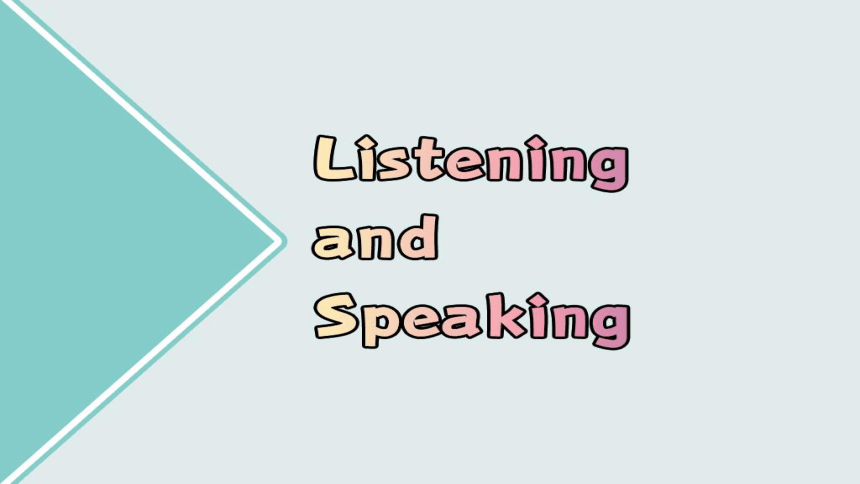
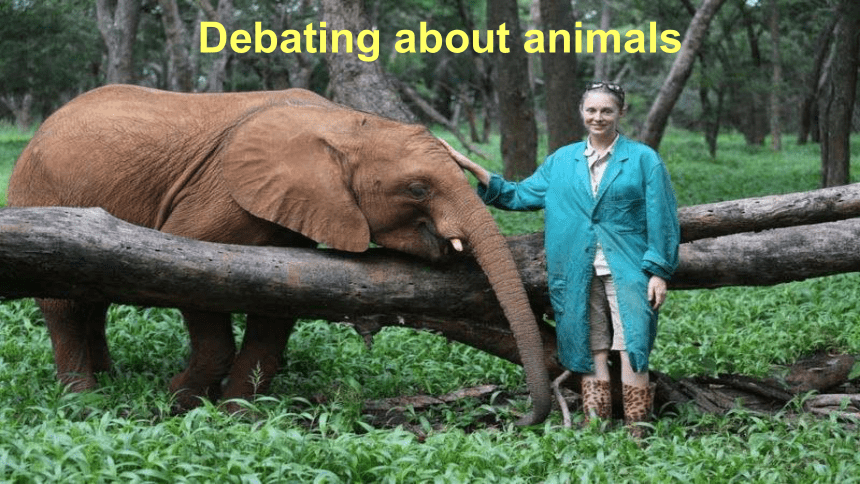
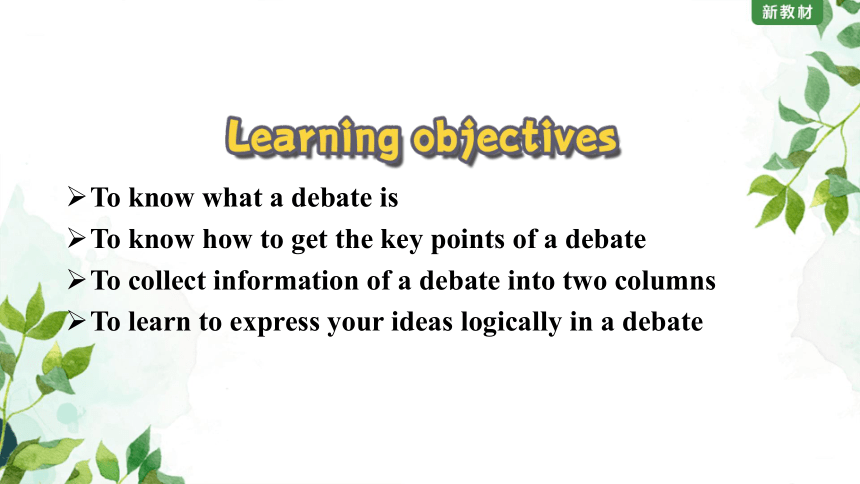
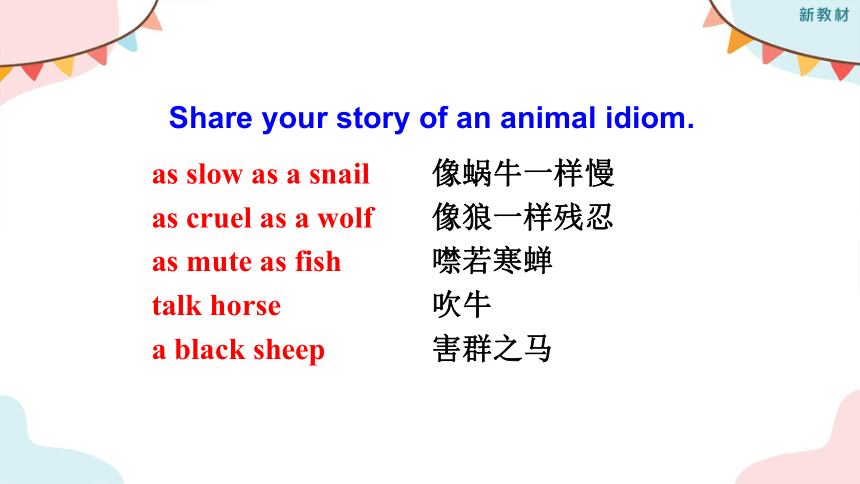
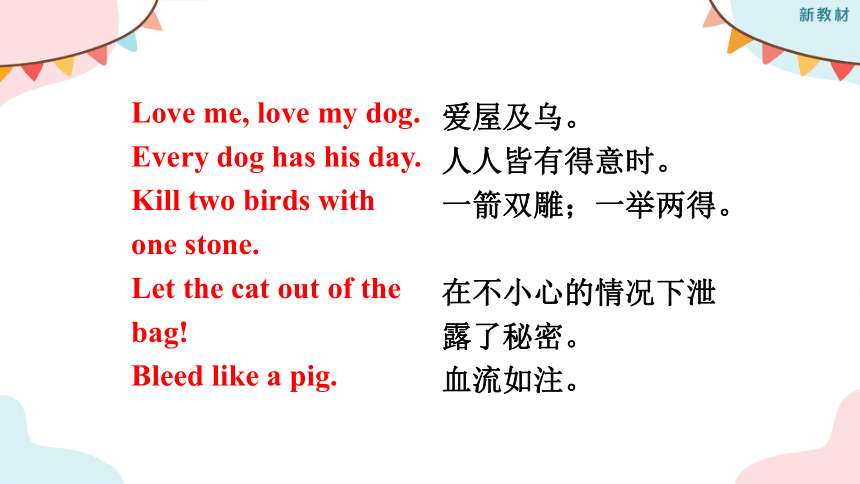
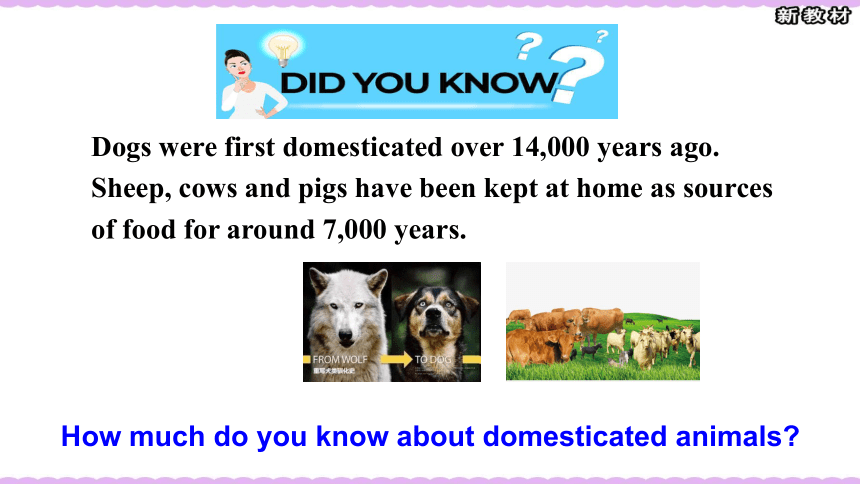

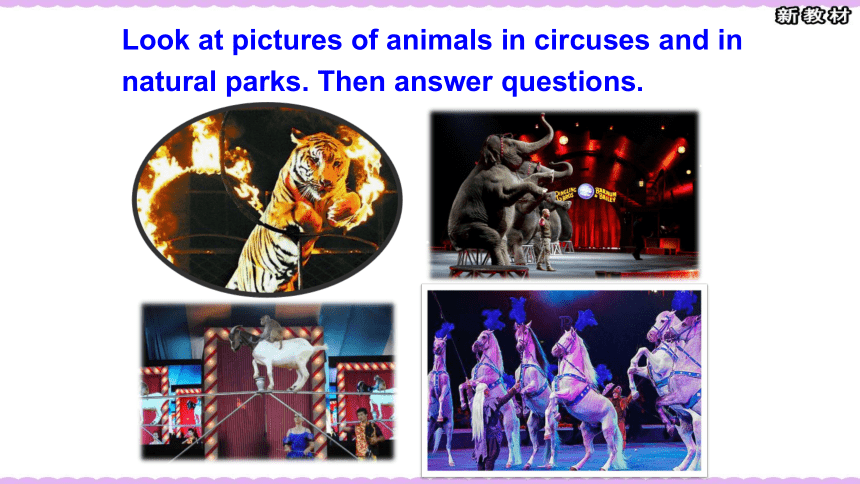
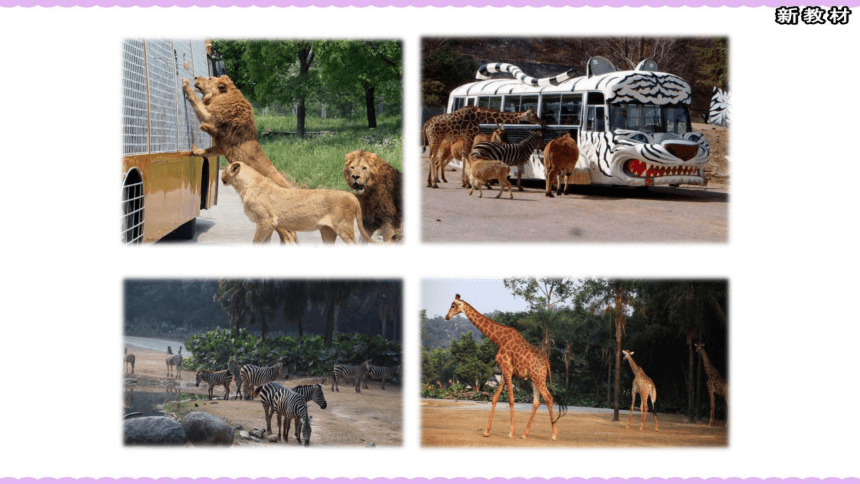
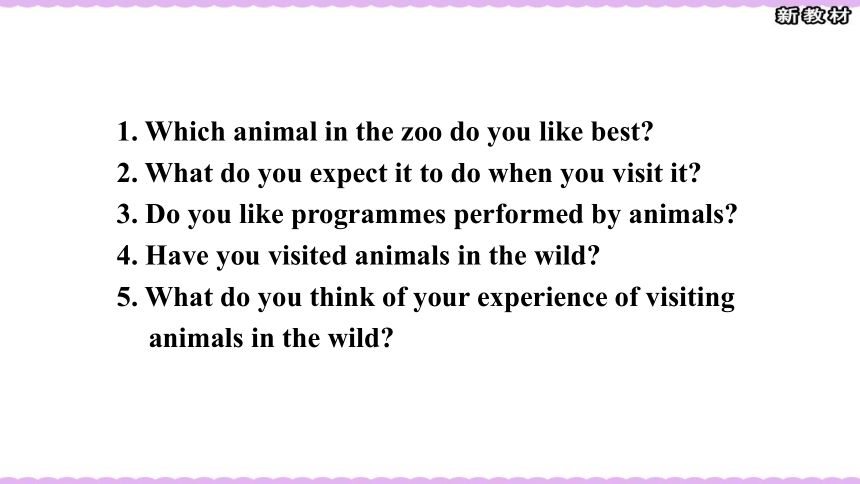
文档简介
(共37张PPT)
Unit 5
Unit 5
Into the wild
Debating about animals
To know what a debate is
To know how to get the key points of a debate
To collect information of a debate into two columns
To learn to express your ideas logically in a debate
Share your story of an animal idiom.
as slow as a snail
as cruel as a wolf
as mute as fish
talk horse
a black sheep
像蜗牛一样慢
像狼一样残忍
噤若寒蝉
吹牛
害群之马
Love me, love my dog.
Every dog has his day.
Kill two birds with one stone.
Let the cat out of the
bag!
Bleed like a pig.
爱屋及乌。
人人皆有得意时。
一箭双雕;一举两得。
在不小心的情况下泄露了秘密。
血流如注。
Dogs were first domesticated over 14,000 years ago. Sheep, cows and pigs have been kept at home as sources of food for around 7,000 years.
How much do you know about domesticated animals
The oldest zoo in the world is in Vienna, opened in 1752. The oldest zoo in China is Beijing Zoo, which was founded in 1906.
Look at pictures of animals in circuses and in natural parks. Then answer questions.
1. Which animal in the zoo do you like best
2. What do you expect it to do when you visit it
3. Do you like programmes performed by animals
4. Have you visited animals in the wild
5. What do you think of your experience of visiting animals in the wild
In a debate, first listen out for the main topic. This is usually a statement or question at the very start of the debate. Speakers will state whether they are for or against the statement. Then, they will introduce their supporting arguments with expressions such as We must remember that …and We can’t deny that…
main topic
for
against
supporting ideas…
supporting ideas…
supporting ideas…
supporting ideas…
Listen to the TV debate and choose the correct topic.
1 Can zoo animals survive in the wild
2 Can zoos offer animals their natural environment
3 Should we keep wild animals in zoos
4 Should we educate people more about animals
Listen again and complete the mind map.
For
Debate
Zoos can help protect animals _____________________.
Zoos are a good way to ___________________________.
Zoos allow us to see and learn about animals in places similar to their ____________________.
in danger of dying out
educate people about animals
natural environments
Debate
Against
Zoo animals can _________________ ___________ and be unable to live on their own when returned to the wild.
Zoos cannot offer animals an environment that’s _____________ their natural one.
Zoos __________________ people than for animals.
depend too much on humans
as good as
do more good for
Tapescript (Page 55)
DJ: Joining us today we have zookeeper Max Wilson, and Amy Lee from the organisation Keep Wild Animals Wild. They are here to discuss whether we should keep wild animals in zoos. Max, let's start with you.
Max: As a zookeeper, I've seen how zoos help protect animals in danger of dying out. For example, my zoo is well-known for its programme to save tigers.
Check your answers!
1.
Amy: I'm afraid I don't agree that these programmes are always successful. We've seen a lot of examples where the animals start to depend too much on humans, and are unable to live on their own when returned to the wild. We've seen a lot of examples that have failed.
Max: But you must admit there are successful ones. And zoos are also a good way to educate people about animals. That's killing two birds with one stone.
2.
4.
Amy: Oh, I totally agree that people should learn as much as possible about animals because we share the planet with them.
Max: Exactly. Zoos allow us to observe animals in places that are similar to their natural environments.
Amy: I'm sorry, but that's just not true. No zoo can offer its animals an environment that's as good as their natural one. Elephants, for example, need a huge amount of space to live happily. On the whole, I think zoos do more good for people than for animals.
3.
5.
6.
DJ: Well, I think we all agree that we should do our best to help protect animals and teach people more about them. Let's continue this discussion after a short break.
How do the speakers express agreement and disagreement
Useful expressions:
Listen again if necessary.
Agreeing
1. Exactly!
2. I agree.
3. That is true.
4. I see your point.
5. No doubt about it.
6. I suppose so.
Disagreeing
1. I don’t agree.
2. That’s just not true.
3. I’m afraid I totally disagree.
4. I’m not so sure about that.
5. I don’t think so.
6. That’s not always the same.
辩论中,双方辩论的焦点话题(即辩题)通常会在辩论的最开始由主持人呈现出来,形式可以为观点陈述或提问题;随后 ,辩论双方会相继陈述已方立场并给出支撑立场的详细论据。
此类文章要找准:
1. 议题为何;2. 几方参与;3. 各方观点;4. 具体论据。
Should we keep wild animals in zoos
Why or why not
Hold a debate on whether we should keep animals as pets.
一辩: FIRST DEBATER
二辩: SECOND DEBATER
对方辩友: my fellow debaters
Your group is divided into two parts. One is for the idea, the other against it.
List your supporting statements.
Write down the examples that can support your statements.
Each of the partner plays a part in the debate. One is to state your party’s main idea; one to support the idea with examples; and one to summarize your party’s idea.
You should make preparations for what supporting ideas your opponents may present.
Exactly!
I agree.
I agree completely.
I couldn’t agree with you more.
That is true.
I see your point.
No doubt about it.
I suppose so.
I feel the same way.
I don’t agree.
That’s just not true.
I’m afraid I totally disagree.
I’m not so sure about that.
I don’t think so.
That’s not always the same.
1. Stating an opinion 陈述观点:
In my opinion…
Personally I think…
I believe that…
I think that…
If you ask me…
I’d like to point out…
In my experience…
2. Challenging an opinion 质疑某种观点:
That can’t be true.
I am against…
I can’t agree with you.
I don’t think that…
I have an opposite opinion…
I’d like to say it in another way…
3. 请求对方解释:
Why do you think like that
Could you give (me) an example
Could you provide some details
What do you mean
What are you trying to say
5. 对自己的看法做出解释:
For example…
To give you an example,…
Let me give you an example,…
4. 询问对方意见:
What do you think
How about you
How do you feel about that
6. 表示理解对方:
I see.
I understand.
I get it.
7. 表示不理解对方:
I don’t get it.
I’m sorry. I don’t understand.
I’m not following you.
FOR
Keeping pets develops a kind and caring attitude towards animals.
Keeping pets is good for people’s physical and mental health.
Keeping pets helps people know more about animals.
…
AGAINST
Animals kept at home can cause trouble for neighbours.
Animals kept at home can cause trouble for neighbors.
Caring for other people is more important than caring for animals.
…
Work in pairs. Think of another topic that is related to animals and hold a debate.
Unit 5
Unit 5
Into the wild
Debating about animals
To know what a debate is
To know how to get the key points of a debate
To collect information of a debate into two columns
To learn to express your ideas logically in a debate
Share your story of an animal idiom.
as slow as a snail
as cruel as a wolf
as mute as fish
talk horse
a black sheep
像蜗牛一样慢
像狼一样残忍
噤若寒蝉
吹牛
害群之马
Love me, love my dog.
Every dog has his day.
Kill two birds with one stone.
Let the cat out of the
bag!
Bleed like a pig.
爱屋及乌。
人人皆有得意时。
一箭双雕;一举两得。
在不小心的情况下泄露了秘密。
血流如注。
Dogs were first domesticated over 14,000 years ago. Sheep, cows and pigs have been kept at home as sources of food for around 7,000 years.
How much do you know about domesticated animals
The oldest zoo in the world is in Vienna, opened in 1752. The oldest zoo in China is Beijing Zoo, which was founded in 1906.
Look at pictures of animals in circuses and in natural parks. Then answer questions.
1. Which animal in the zoo do you like best
2. What do you expect it to do when you visit it
3. Do you like programmes performed by animals
4. Have you visited animals in the wild
5. What do you think of your experience of visiting animals in the wild
In a debate, first listen out for the main topic. This is usually a statement or question at the very start of the debate. Speakers will state whether they are for or against the statement. Then, they will introduce their supporting arguments with expressions such as We must remember that …and We can’t deny that…
main topic
for
against
supporting ideas…
supporting ideas…
supporting ideas…
supporting ideas…
Listen to the TV debate and choose the correct topic.
1 Can zoo animals survive in the wild
2 Can zoos offer animals their natural environment
3 Should we keep wild animals in zoos
4 Should we educate people more about animals
Listen again and complete the mind map.
For
Debate
Zoos can help protect animals _____________________.
Zoos are a good way to ___________________________.
Zoos allow us to see and learn about animals in places similar to their ____________________.
in danger of dying out
educate people about animals
natural environments
Debate
Against
Zoo animals can _________________ ___________ and be unable to live on their own when returned to the wild.
Zoos cannot offer animals an environment that’s _____________ their natural one.
Zoos __________________ people than for animals.
depend too much on humans
as good as
do more good for
Tapescript (Page 55)
DJ: Joining us today we have zookeeper Max Wilson, and Amy Lee from the organisation Keep Wild Animals Wild. They are here to discuss whether we should keep wild animals in zoos. Max, let's start with you.
Max: As a zookeeper, I've seen how zoos help protect animals in danger of dying out. For example, my zoo is well-known for its programme to save tigers.
Check your answers!
1.
Amy: I'm afraid I don't agree that these programmes are always successful. We've seen a lot of examples where the animals start to depend too much on humans, and are unable to live on their own when returned to the wild. We've seen a lot of examples that have failed.
Max: But you must admit there are successful ones. And zoos are also a good way to educate people about animals. That's killing two birds with one stone.
2.
4.
Amy: Oh, I totally agree that people should learn as much as possible about animals because we share the planet with them.
Max: Exactly. Zoos allow us to observe animals in places that are similar to their natural environments.
Amy: I'm sorry, but that's just not true. No zoo can offer its animals an environment that's as good as their natural one. Elephants, for example, need a huge amount of space to live happily. On the whole, I think zoos do more good for people than for animals.
3.
5.
6.
DJ: Well, I think we all agree that we should do our best to help protect animals and teach people more about them. Let's continue this discussion after a short break.
How do the speakers express agreement and disagreement
Useful expressions:
Listen again if necessary.
Agreeing
1. Exactly!
2. I agree.
3. That is true.
4. I see your point.
5. No doubt about it.
6. I suppose so.
Disagreeing
1. I don’t agree.
2. That’s just not true.
3. I’m afraid I totally disagree.
4. I’m not so sure about that.
5. I don’t think so.
6. That’s not always the same.
辩论中,双方辩论的焦点话题(即辩题)通常会在辩论的最开始由主持人呈现出来,形式可以为观点陈述或提问题;随后 ,辩论双方会相继陈述已方立场并给出支撑立场的详细论据。
此类文章要找准:
1. 议题为何;2. 几方参与;3. 各方观点;4. 具体论据。
Should we keep wild animals in zoos
Why or why not
Hold a debate on whether we should keep animals as pets.
一辩: FIRST DEBATER
二辩: SECOND DEBATER
对方辩友: my fellow debaters
Your group is divided into two parts. One is for the idea, the other against it.
List your supporting statements.
Write down the examples that can support your statements.
Each of the partner plays a part in the debate. One is to state your party’s main idea; one to support the idea with examples; and one to summarize your party’s idea.
You should make preparations for what supporting ideas your opponents may present.
Exactly!
I agree.
I agree completely.
I couldn’t agree with you more.
That is true.
I see your point.
No doubt about it.
I suppose so.
I feel the same way.
I don’t agree.
That’s just not true.
I’m afraid I totally disagree.
I’m not so sure about that.
I don’t think so.
That’s not always the same.
1. Stating an opinion 陈述观点:
In my opinion…
Personally I think…
I believe that…
I think that…
If you ask me…
I’d like to point out…
In my experience…
2. Challenging an opinion 质疑某种观点:
That can’t be true.
I am against…
I can’t agree with you.
I don’t think that…
I have an opposite opinion…
I’d like to say it in another way…
3. 请求对方解释:
Why do you think like that
Could you give (me) an example
Could you provide some details
What do you mean
What are you trying to say
5. 对自己的看法做出解释:
For example…
To give you an example,…
Let me give you an example,…
4. 询问对方意见:
What do you think
How about you
How do you feel about that
6. 表示理解对方:
I see.
I understand.
I get it.
7. 表示不理解对方:
I don’t get it.
I’m sorry. I don’t understand.
I’m not following you.
FOR
Keeping pets develops a kind and caring attitude towards animals.
Keeping pets is good for people’s physical and mental health.
Keeping pets helps people know more about animals.
…
AGAINST
Animals kept at home can cause trouble for neighbours.
Animals kept at home can cause trouble for neighbors.
Caring for other people is more important than caring for animals.
…
Work in pairs. Think of another topic that is related to animals and hold a debate.
